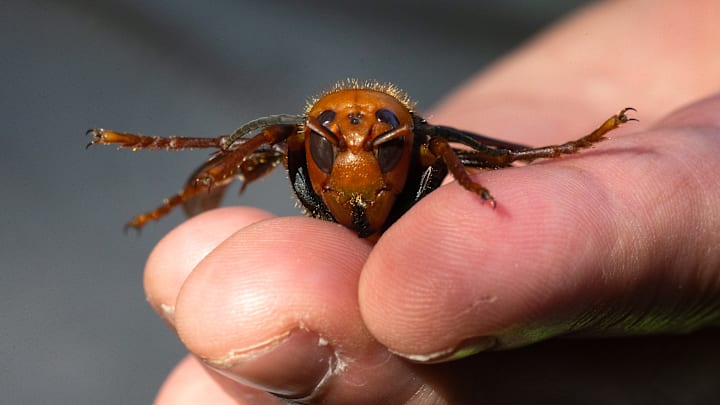Murder hornets, a.k.a Asian giant hornets, aren't as dangerous as some headlines from spring of 2020 led people to believe. Though they rarely attack humans and can only kill in swarms, they still pose a serious threat to the environment. Now, a new study published in Current Biology is proposing an innovative way to eradicate them: literal thirst traps laced with pheromones.
As CNN reports, a team of researchers from China and the U.S. were able to identify three key chemicals that make up the Asian giant hornet queen’s sex pheromone. After obtaining hexanoic acid, octanoic acid, and decanoic acid, they recreated this alluring scent in traps that were positioned near hornet nests.
Though the bait didn't appeal to female hornets, it did a great job attracting male specimens. Over the course of two seasons, the scientists caught thousands of males with their sex traps.
Native to China, Japan, and other parts of Asia, Asian giant hornets were first spotted in Washington state in late 2019. They've since expanded throughout the Pacific Northwest and into Canada, and experts are looking for ways to stop them from spreading throughout the rest of the continent.
They haven't killed any humans since their arrival in North America, but the 2-inch-long insects are a menace to native bees and honeybees, who haven't adapted to defend themselves against hornet attacks like the bees in Asia. Using their spiked mandibles, murder hornets rip off their prey's heads and bring the thoraxes back to their nests for their young to feast on. The damage they cause could cost $100 million in bee-pollinated crops in a year.
Hornet sex traps could be a valuable tool in the fight to eradicate the hornets from the continent. The size of their footprint is still unclear, and the traps could be deployed to collect data and better understand their range. By publishing their formula for fake hornet pheromones for anyone to use, the study authors hope that people in invaded regions will start building traps of their own.
[h/t CNN]
